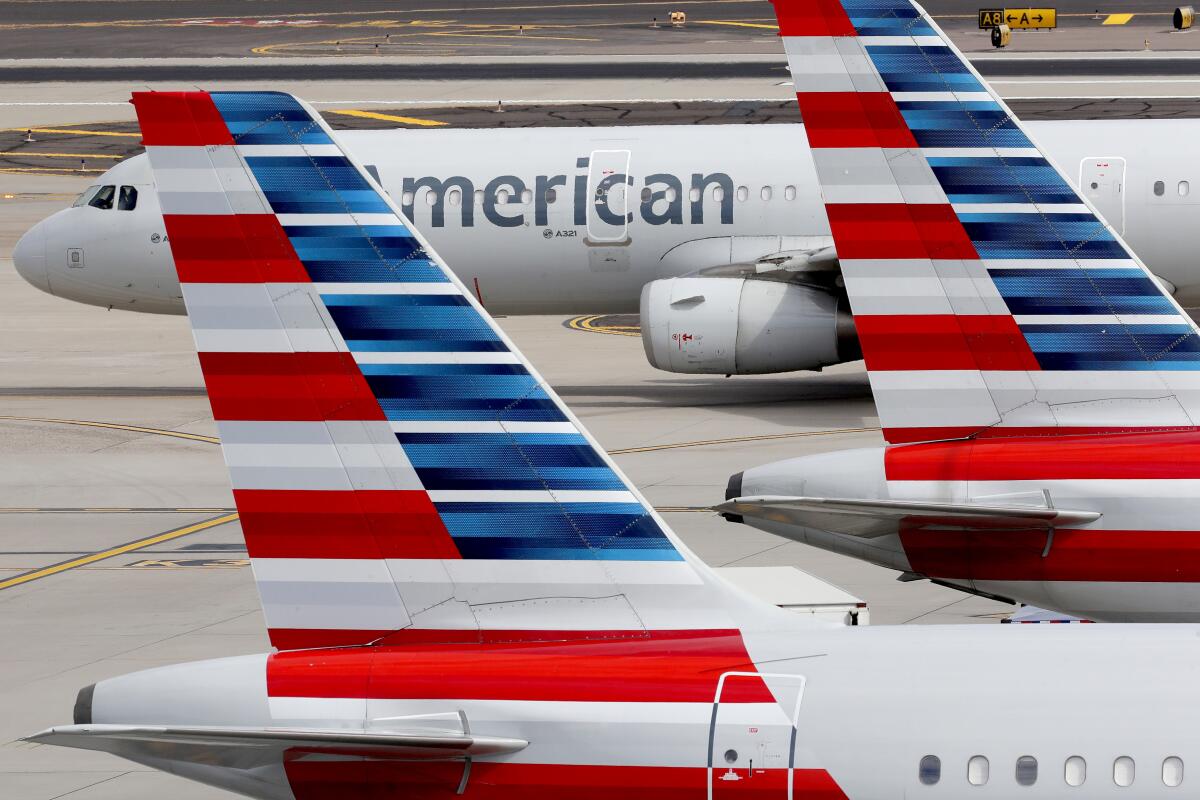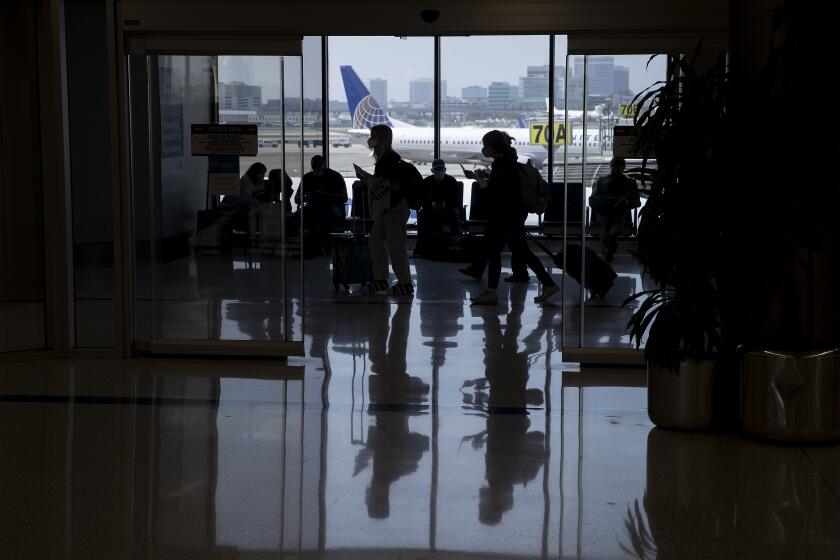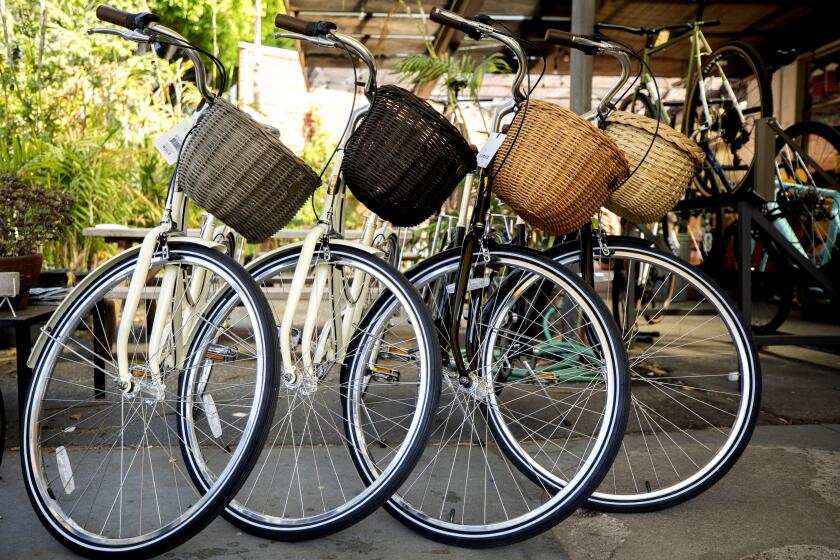Consumers will pay more to fly because of American Airlines-JetBlue deal, fed suit says

- Share via
The Justice Department and officials in California and five other states have filed a lawsuit to block a partnership formed by American Airlines and JetBlue Airways, saying it would reduce competition and lead to higher fares for flights between many U.S. cities.
The Justice Department said Tuesday that the agreement would eliminate important competition in Boston and New York and reduce JetBlue’s incentive to compete against American in other parts of the country.
U.S. Atty. Gen. Merrick Garland said the lawsuit was about ensuring fair competition that lets Americans fly at affordable prices.
“In an industry where just four airlines control more than 80% of domestic air travel, American Airlines’ ‘alliance’ with JetBlue is, in fact, an unprecedented maneuver to further consolidate the industry,” Garland said in a statement. “It would result in higher fares, fewer choices, and lower-quality service if allowed to continue.”
In California, flights between at least nine airports and the East Coast would be affected, California Atty. Gen. Rob Bonta said Tuesday. The routes to and from New York and Boston are heavily traveled not just from large airports such as Los Angeles International but also smaller fields including those in Burbank, Long Beach and Ontario, he said.
COVID-19 has thwarted the expected return of business travel and pushed flight prices down — for now. Holiday travel bookings are already on the rise.
The airlines vowed to fight the lawsuit.
American and JetBlue say they have started 58 new routes from four airports in the Northeast, added flights on other routes, and plan new international routes through 2022 because of the partnership.
American Chief Executive Doug Parker said blocking the JetBlue deal would “take away consumer choice and inhibit competition, not encourage it. This is not a merger: American and JetBlue are — and will remain — independent airlines.”
JetBlue Chief Executive Robin Hayes said his airline has been successful in New York and Boston but can’t grow much more against Delta Air Lines and United Airlines because of hurdles such as the difficulty of getting more flight times at the region’s crowded airports.
“These obstacles to growth led us to an unlikely alliance with American Airlines which, even as the world’s largest carrier, also has not been able to compete with Delta Air Lines’ and United Airline’s dominance in the Northeast,” Hayes said.
American and JetBlue announced their deal last year and have already started to coordinate their flights in the Northeast. They say it is a pro-consumer arrangement that has already helped them add several dozen new routes and challenge Delta and United in the region.
The lawsuit comes two months after President Biden issued an executive order calling on government agencies to help consumers by increasing competition in the airline industry and other parts of the economy.
The agreement was approved with certain conditions by the Transportation Department in the final days of the Trump administration. However, antitrust lawyers at the Justice Department began examining the deal more closely this spring and requested interviews and documents from the airlines, according to an airline lawyer involved in the case.
The airlines call their partnership the Northeast Alliance. It lets American and JetBlue sell seats on each other’s flights and give customers reciprocal benefits in the separate frequent-flyer programs.
Many items destined for retailer shelves this holiday season are hopelessly snarled in the global supply chain. What does that mean for shoppers?
American and JetBlue argue that the deal is pro-consumer by making their combination a stronger competitor in the Northeast. Together, the airlines say, they controlled 16% of the region’s air-travel market before the partnership, and that has grown to 24%.
The airlines argue that the Justice Department has no evidence that their agreement is leading to higher fares. Air-travel prices have been hurt by the pandemic, which continues to cut into travel demand and push fares lower.
American and JetBlue say nothing in their deal controls pricing, and that each airline will continue to set its own fares.
Southwest Airlines and Spirit Airlines filed formal complaints against the American-JetBlue alliance, however, arguing that — along with a similar deal on the West Coast between American and Alaska Airlines — it will make American too big.
Spirit said the Transportation Department didn’t listen enough to the public before approving the deal, although the agency did require American and JetBlue to make concessions, including the surrender of some takeoff and landing slots at John F. Kennedy International Airport in New York and Washington Reagan National Airport outside Washington. Spirit and Southwest asked for more concessions.
The Justice Department lawsuit was filed in federal district court in Massachusetts. In addition to California, Massachusetts, Florida, Pennsylvania, Virginia, Arizona and the District of Columbia joined the suit.
More to Read
Inside the business of entertainment
The Wide Shot brings you news, analysis and insights on everything from streaming wars to production — and what it all means for the future.
You may occasionally receive promotional content from the Los Angeles Times.












